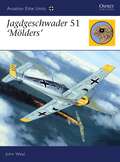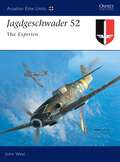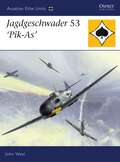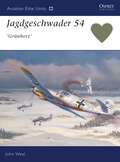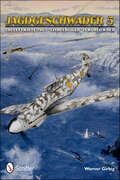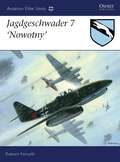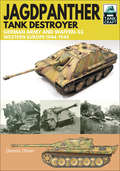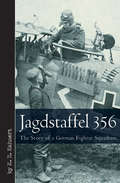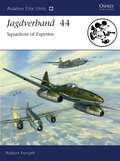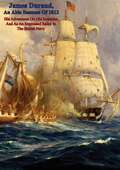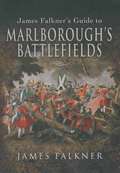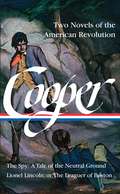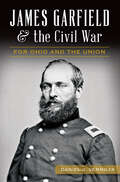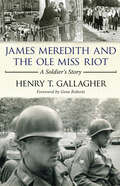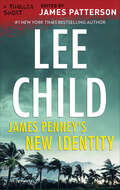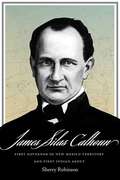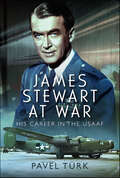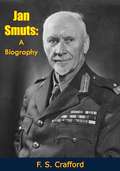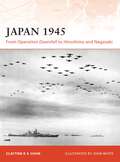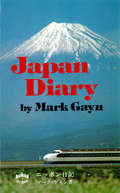- Table View
- List View
Jagdgeschwader 51 'Mölders'
by John WealJG 51 were one of the Luftwaffe’s top wartime fighter units, yet their story has never been told in English. The unit’s history encapsulates the fortunes of the Luftwaffe’s fighter arm as a whole - the heady successes of the early months, the steady attrition and the growing strength of the opposition during the mid-war years, and the final chaos and collapse of the last days. But it is perhaps the details of the pilots who served with the unit that sets JG 51 apart. During the course of the war it numbered more Knight’s Cross winners among its ranks than any other. And it is their stories – their successes, exploits and eventual fates – which brings this history to life.
Jagdgeschwader 52: The Experten
by John WealJagdgeschwader 52 (JG 52) was the most successful and highest-scoring fighter unit, not just in Germany’s World War 2 Luftwaffe, but in the entire annals of aviation history. No other fighter group has ever come close to matching its staggering total of around 9000 enemy aircraft shot down in combat. And yet, because much of that combat took place over the tractless wastes of the Russian front, very little has been written in English about the exploits of this charismatic unit. This book provides a full combat history of JG 52 and its members, including the three top-scoring aces of all time, who claimed a total of 900 victories between them.
Jagdgeschwader 53 'Pik-As'
by John WealArguably the archetypal Luftwaffe fighter unit of World War 2, JG 53 aircraft were encountered on almost every fighting front from the first day of hostilities until the last. During almost six years of near-constant campaigning, JG 53 took a steady toll of Allied aircraft in every theatre it fought over. The variety of camouflage finishes worn by its machines -winter white, desert dapple and Reich's defence black - and the progression of variants are reflected in an eye-opening colour section. John Weal has spent several years researching in German archives and this, together with his personal contact with several veterans, results in an authoritative and human account of JG 53's long and eventful war.
Jagdgeschwader 54: 'Grünherz'
by John WealOne of the most successful of the high-scoring Luftwaffe Jagdgeschwader during World War 2, JG 54 ‘Grünherz’ (Green Hearts) was formed from three disparate fighter 'Gruppen' immediately prior to the Battle of Britain. Having enjoyed immediate success over the Channel and South-east England during the summer of 1940, the unit was transferred to the Eastern Front in the spring of 1941 in preparation for Operation Barbarossa - the German invasion of the Soviet Union. JG 54 would remain a Jagdwaffe stalwart in the east, flying firstly Bf 109Fs and then the Fw 190. By war’s end, the Geschwader’s pilots had claimed over 9500 kills, and produced over 100 aces. Men like Hans Philipp, Walter Nowotny and Otto Kittel are profiled in this volume, which reveals the struggle in the face of overwhelming odds that was the lot of the Jagdflieger on the Eastern Front.
Jagdgeschwader 5: The Luftwaffe’s JG 5 “Eismeerjäger” in World War II
by Werner GirbigFirst English language edition of the definitive JG 5 history
Jagdgeschwader 7 Nowotny
by Jim Laurier Robert ForsythWhen the revolutionary Messerschmitt Me 262 jet fighter first appeared in the skies over northwest Europe in mid-1944, it represented one of the greatest challenges to Allied air superiority. The first group to solely fly jet fighters, Jagdgeschwader 7 was tasked with wrestling back command of the skies. Put almost immediately into action, despite fuel shortages, poor training and problems with the jet engine, victories quickly followed against both US and British aircraft. By the end of the war, the Jagdgeschwader had claimed nearly 200 enemy aircraft destroyed in daylight bomber raids during 1945. This book follows the history of the JG 7 unit, examining how their courage, determination and the most advanced aircraft in the world were simply not enough to ensure victory. In the final section of the book Robert Forsyth details how JG 7 were eventually defeated by gradual losses, restricted operating conditions, lack of fuel and overwhelming Allied fighter strength.
Jagdpanther Tank Destroyer: German Army and Waffen-SS, Western Europe, 1944–1945 (TankCraft)
by Dennis Oliver&“First class illustration and a very effective text overview . . . covers the development, on the Panther chassis, of a very effective tank destroyer.&”— Firetrench Combining the destructive firepower of the 88mm gun with the outstanding mobility of the Panther series, the Jagdpanther is quite probably the best-known tank destroyer of the Second World War. In the vehicle&’s first action on 30 July 1944, three Jagdpanthers managed to destroy eleven British tanks in a vicious two-minute fire fight near the village of Les Loges in Normandy, cementing the Jagdpanther&’s reputation as a potent tank killer. In his fifth book in the TankCraft series, Dennis Oliver uses contemporary photographs and meticulously researched, superbly presented color and monochrome illustrations to tell the story of these heavy self-propelled antitank guns and the units which operated them in the German defense of the Western Front. As with all the books in the TankCraft series, a large part of this work showcases available model kits and aftermarket products, complemented by a gallery of expertly constructed and painted models. Technical details as well as modifications introduced during production and in the field are also explained giving the modeler all the information and knowledge required. &“Really interesting concept to combine historical, technical and modeling content in one book. Nicely illustrated . . . As a first Jagdpanther book for modelers seeking an economical source on models, accessories and paint schemes, this is valuable… Highly Recommended for Beginner to Intermediate builders.&”—AMPS
Jagdpanther vs SU-100
by David Higgins Richard ChasemoreThe culmination of big-gun German and Soviet tank destroyer design can be found in their clashes in Hungary in the spring of 1945. As World War II in Europe reached its end, armor development and doctrine had experienced several years of massively accelerated change, especially within the crucible of the Eastern Front. The German Jagdpanther and Soviet SU-100, both turretless tank destroyer designs based on a 'traditional' turret-tank chassis, were the culminating examples of how the progression of experience, resources and time constraints produced vehicles that were well suited for roles of defence and offence, respectively. The Jagdpanther represented a well-balanced solution and an excellent use of limited resources, while the SU-100 was a natural progression of the rudimentary but numerous SU-85.As the role of tanks broadened from essentially infantry support to anti-tank, armor thickness and armament increased to enable AFVs better to survive such encounters. Expensive and hard to upgrade with larger armament owing to the constraints imposed by turret-ring size and suspension, turreted tanks gave way in some contexts to new designs. The Soviets and the Germans alike found that more powerful guns could be installed directly into the hull, which in turn reduced the vehicle's silhouette, and allowed for increased armour protection for the weight. A rapid arms race resulted in the East with each side attempting to develop a battlefield edge, if only for a limited time.For the Germans the 8.8cm-armed Jagdpanther was intended for more defensive roles, such as ambushing or flank protection at long range where its superior sights and high-velocity rounds imparted an advantage. Its sloped armor and relatively light weight meant, unlike the more massive (and less practical) Jagdtiger (a Tiger II derivative), it could also operate in a more mobile capacity. Its superior optics offered key firepower advantages, but its origins in the overengineered Panther design meant it was susceptible to breakdown and mechanical problems.In contrast, the closest Soviet equivalent, the SU-100, was designed to operate alongside armor and mechanized forces in an offensive capacity, where its 100mm main gun would help counter heavier enemy armour when encountered. Although its speed and armour protection were comparable, the greater numbers fielded late in the war often proved decisive against an adversary increasingly forced to fight despite inadequate logistics and training. By this stage of the conflict, the Germans were forced to adopt ad hoc battle groups to coordinate their decimated parent formations' assets. The Soviets in turn possessed operational momentum, and were perhaps less concerned with tactical losses, in part as immobilized vehicles could be more easily recovered and reintroduced into combat.
Jagdstaffel 356: The Story of a German Fighter Squadron (Vintage Aviation Library)
by M.E. KaehnertA visceral and accurate firsthand account of flying with the Imperial German Air Force during WWI. The airborne fighting squadrons of the Imperial German Luftstreitkräfte—known as the Jagdstaffel or Jasta—were a fearsome and elite force throughout the Great War. Though the entire force was dissolved and their aircraft destroyed by order of the Treaty of Versailles, the stories of the pilotremain in books like Jagdstaffel 356. Although the author has given this Jagdstaffel a fictitious number and changed the names of the pilots composing it, the vivid descriptions and accurate narrative have the genuine ring of truth. Anyone who has had experience of flying on the Western Front or who has studied it since will recognize this chronicle as factual. Many experts believe this work draws on the experience of the Bavarian Jasta 35, which flew against the British; however, whatever its real number may have been, the squadron depicted in Jagdstaffel 356 undoubtedly fought in the air over Flanders in 1918.
Jagdverband 44
by Jim Laurier Robert ForsythJagdverband 44 was formed in February 1945 on Hitler's orders, to fly the Me 262 "Stormbird", the world's first operational jet fighter, and demonstrate its superiority. The unit was led by the legendary Adolf Galland, who recruited some of Germany's leading aces into it, to the extent that it was said that the Knight's Cross was its unofficial badge. JV 44 engaged the US Ninth Army Air Force over Bavaria and, with its significant speed advantage and powerful armament of cannon and rockets, the Me 262 proved a formidable interceptor in the hands of its expert pilots. In its brief operational existence, never able to get more than six jets in the air at any one time, this small unit achieved approximately 50 kills in less than a month. Unfortunately for the German defensive effort (though Galland himself was glad not to have prolonged the war) there were not enough Me 262s to have any overall effect on the Allied air campaign.This book is a dramatic record of a highly individual unit and an exciting early chapter in the history of the jet fighter. Four of the world's ten surviving Me 262s are major attractions at flight museums in the USA and recently constructed replicas will soon be a feature of air shows around the nation and the "experten" aces of the Luftwaffe have an enduring fascination.From the Trade Paperback edition.
Jake: Amores de Redenção #2 (Amores de Redenção #2)
by Anna ScottJake é o cara mau, de mau humor. Hope é uma garota doce e generosa com um passado que prefere esquecer. Depois que ambos perdem um grande amigo, são jogados juntos de novas maneiras que nunca esperavam. Uma atração fervilhante aparece, mas quando Jake descobre que Hope está em sério perigo, ele não nada irá pará-lo de protegê-la. Ela quer ser forte, ela precisa ser independente. Ele quer proteger, ele precisa que ela precise dele. Como esses dois encontrarão o caminho?
James Durand, An Able Seaman Of 1812: His Adventures On Old Ironsides And As An Impressed Sailor In The British Navy
by James DurandStep aboard the legendary warships of the early 19th century with James Durand, an able seaman whose riveting memoirs offer a vivid glimpse into life at sea during a tumultuous era. In "James Durand, An Able Seaman of 1812," Durand recounts his harrowing experiences on the USS Constitution, famously known as "Old Ironsides," and the British Navy, where he was forcibly impressed into service.Durand’s narrative takes readers on a journey through the heart of the War of 1812, a pivotal conflict between the young United States and Great Britain. With the eloquence of a seasoned storyteller, Durand describes the daily grind of naval life, the brutal realities of battle, and the camaraderie and conflicts among the crew. His tales of courage and resilience highlight the indomitable spirit of sailors who faced not only the dangers of the sea but also the uncertainties of war.From his initial enlistment and the thrill of serving on Old Ironsides to the despair of being captured and impressed into the British Navy, Durand’s memoirs provide a rare and authentic account of maritime history. His firsthand observations offer a unique perspective on the naval strategies and shipboard life of the early 1800s, making this book an invaluable resource for historians and naval enthusiasts alike."James Durand, An Able Seaman of 1812" is more than just a memoir; it is a testament to the enduring human spirit and a poignant reminder of the sacrifices made by those who served at sea. Through Durand’s eyes, readers will experience the relentless pursuit of freedom and the unyielding determination that defined an era. This compelling narrative, rich with historical detail and personal insight, will transport you back in time to witness the adventures and adversities of a seaman caught between two nations.
James Falkner's Guide to Marlborough's Battlefields
by James FalknerThree hundred years ago Queen Anne's Captain-General, John Churchill 1st Duke of Marlborough, led the Allied armies in an epic struggle against the powerful French forces of Louis XIV, in campaigns that stretched across wide areas of the Low Countries, France and Germany. Marlborough's victories at the Schellenberg, Blenheim, Ramillies, Oudenarde and Malplaquet are among the most remarkable feats in all of British military history. Marlborough broke France's military power for a hundred years. As James Falkner demonstrates in this, the first full-scale guide to the subject, the story of these famous campaigns makes compelling and exciting reading, and the sites associated with them are evocative places that can easily be visited today. His battlefield guide is essential reading for anyone who is keen to understand the military history of the era, and it is an invaluable companion for visitors to the many battlefields associated with Marlborough's triumphs.
James Fenimore Cooper: The Spy: A Tale of the Neutral Ground / Lionel Lincoln; or, The Leaguer of Boston (Library of America James Fenimore Cooper Edition #4)
by James Fenimore Cooper Alan TaylorThe American Revolution comes to vivid life in two dramatic tales of espionage, intrigue, and romance from the author of The Last of Mohicans.With his second novel, The Spy:A Tale of the Neutral Ground, in 1821, James Cooper (the Fenimore would come later) found his true voice and what became his most enduring subject matter: the history of his young nation, born of the clash between Old World and New. Set largely in Westchester County--site of the real-life intrigues of Benedict Arnold and Major John Andre--The Spy traces the conflicting allegiances of rebels and loyalists, with the supposed loyalist spy Harvey Birch (actually in the service of George Washington) finding himself caught up in conflicts between friendship and duty as he moves between the two sides. Washington himself makes an incognito appearance as the mysterious "Mr. Harper." Cooper continued in the same vein with Lionel Lincoln; Or, The Leaguer of Boston (1825), a carefully researched panorama of the coming of the Revolution, complete with detailed depictions of the battles of Lexington and Concord and Bunker Hill. With the hero a native-born American serving in the British Army, issues of loyalty are again complex, and some American reviewers, not for the last time, found Cooper's politics a bit too ambiguous for comfort.LIBRARY OF AMERICA is an independent nonprofit cultural organization founded in 1979 to preserve our nation’s literary heritage by publishing, and keeping permanently in print, America’s best and most significant writing. The Library of America series includes more than 300 volumes to date, authoritative editions that average 1,000 pages in length, feature cloth covers, sewn bindings, and ribbon markers, and are printed on premium acid-free paper that will last for centuries.
James Garfield & the Civil War: For Ohio and the Union
by Daniel J VermilyaThis biography of America&’s twentieth president sheds light on his Civil War years, when he served as a major general for the Union Army. While his presidency was tragically cut short by his assassination, James Abraham Garfield's eventful life covered some of the most consequential years of American history. When the United States was divided by war, Garfield was one of many who stepped forward to defend the Union. In this biography, historian Daniel J. Vermilya reveals the little-known story of Garfield's role in the Civil War. From humble beginnings in Ohio, Garfield rose to become a major general in the Union army. His military career took him to the backwoods of Kentucky, the fields of Shiloh and Chickamauga, and ultimately to the halls of Congress. His service during the war established Garfield as a courageous leader who would one day lead the country as president.
James Meredith and the Ole Miss Riot: A Soldier's Story
by Henry T. GallagherIn September 1962, James Meredith became the first African American admitted to the University of Mississippi. A milestone in the civil rights movement, his admission triggered a riot spurred by a mob of three thousand whites from across the South and all but officially stoked by the state's segregationist authorities. Historians have called the Oxford riot nothing less than an insurrection and the worst constitutional crisis since the Civil War. The escalating conflict prompted President John F. Kennedy to send twenty thousand regular army troops, in addition to federalized Mississippi National Guard soldiers, into the civil unrest (ten thousand into the town itself) to quell rioters and restore law and order. James Meredith and the Ole Miss Riot is the memoir of one of the participants, a young army second lieutenant named Henry Gallagher, born and raised in Minnesota. His military police battalion from New Jersey deployed, without the benefit of riot-control practice or advance briefing, into a deadly civil rights confrontation. He was thereafter assigned as the officer-in-charge of Meredith's security detail at a time when he faced very real threats to his life. Gallagher's first-person account considers the performance of his fellow soldiers before and after the riot. He writes of the behavior of the white students, some of them defiant, others perceiving a Communist-inspired Kennedy conspiracy in Meredith's entry into Mississippi's “flagship” university. The author depicts the student, Meredith, a man who at times seemed disconnected with the violent reality that swirled around him, and who even aspired to be freed of his protectors so that he could just be another Ole Miss student. James Meredith and the Ole Miss Riot is both an invaluable perspective on a pivotal moment in American history and an in-depth look at a unique home front military action. From the vantage of the fiftieth anniversary of the riot, Henry T. Gallagher reveals the young man he was in the midst of one of history's most profound tests, a soldier from the Midwest encountering the powder keg of the Old South and its violent racial divisions.
James Penney's New Identity (The Thriller Shorts #4)
by Lee ChildFrom a New York Times–bestseller, a thriller short story about a Vietnam veteran on the run who receives help from a young military cop named Jack Reacher. Before Jack Reacher became the seminal, nomadic hero he is today and #1 New York Times–bestselling writer Lee Child reached his current iconic literary stature, there was James Penney, who we meet in this intense thriller short. Penney was originally envisioned as a character in Child&’s second Jack Reacher tale, Die Trying. Though an interesting character, Penney was ultimately excised during the editing process and readers didn&’t have the pleasure of meeting him. Now he&’s been resurrected in a tale that features a brief glimpse of Jack Reacher&’s early career. Don&’t miss this heart-pumping tale of suspense!
James Silas Calhoun: First Governor of New Mexico Territory and First Indian Agent
by Sherry RobinsonVeteran journalist and author Sherry Robinson presents readers with the first full biography of New Mexico&’s first territorial governor, James Silas Calhoun. Robinson explores Calhoun&’s early life in Georgia and his military service in the Mexican War and how they led him west. Through exhaustive research Robinson shares Calhoun&’s story of arriving in New Mexico in 1849—a turbulent time in the region—to serve as its first Indian agent. Inhabitants were struggling to determine where their allegiances lay; they had historic and cultural ties with Mexico, but the United States offered an abundance of possibilities.An accomplished attorney, judge, legislator, and businessman and an experienced speaker and negotiator who spoke Spanish, Calhoun was uniquely qualified to serve as the first territorial governor only eighteen months into his service. While his time on the New Mexico political scene was brief, he served with passion, intelligence, and goodwill, making him one of the most intriguing political figures in the history of New Mexico.
James Stewart at War: His Career in the USAAF
by Pavel TürkExplores the story of one star of the Silver Screen’s role in the Second World War James Stewart was already a Hollywood star when the United States went to war in December 1941. Having received an Academy Award for Best Actor in 1940 for his role in The Philadelphia Story, he had become a familiar face to movie goers by the time that the Japanese struck at Pearl Harbor. By that time ‘Jimmy’ had already received his private pilot’s license and when his name was drawn by the Drafting Commission on 29 October 1940, he applied to join the US Army Air Corps. He continued his pilot training and just twelve days before he received his draft, he had obtained his commercial pilot’s license. It was on 18 January 1942, that the Hollywood star was called into active duty. Jimmy was transferred to the 929th Bombardier Training School, based at Kirtland Field in New Mexico, on 19 August 1942. There he served as a pilot almost until the end of the year. Though his film company had managed to secure a ‘static personnel’ role, Jimmy was determined to fly in combat. So it was that Captain James Maitland Stewart was appointed as the Commander of the 703rd Bombardment Squadron. Finally, on 17 November 1943, he landed in the UK and his operational war began. Flying in a Consolidated B-24 Liberator, Jimmy undertook his first bombing mission on 13 December 1943, the target on this occasion being the German U-boat facilities at Kiel. Just seven days later he was once again sent to attack a target in Germany, this time the port of Bremen. A further eighteen missions followed over the following fifteen months. Stewart took part in raids against targets across Germany, including Berlin, all of which are analyzed in detail along with a fabulous collection of photographs of the aircraft Jimmy flew and the men he flew with. His contribution to victory over Germany was not confined to flying B-24 bombers, He also functioned as an Operations Officer for a period and led the Liberators of the 2nd Combat Bomb Wing to an attack on the railway marshaling yards at Halle from the navigator’s seat of a de Haviland Mosquito. James Stewart rose to the rank of major from private in just four years, an achievement few can claim. He was awarded the Distinguished Flying Cross for his actions as deputy commander of the 2nd Bombardment Wing, and the Air Medal with three oak leaf clusters. The French bestowed him with the Croix de Guerre with palm. Having risen to the rank of lieutenant colonel, James Stewart returned to the silver screen after the war. He continued to play a role in the Army Air Forces reserve, during which period he was promoted to brigadier general. In so doing, Stewart became the highest-ranking actor in American military history.
Jan Smuts: A Biography
by F. S. Crafford‘A just biography of an important figure—political philosopher, soldier in three wars, scientist, statesman—Jan Smuts, who has played a long and decisive role in the formation and consolidation of South Africa. Masterful, energetic, intolerant, often highhanded, Smuts has never been a popular leader, but never once did he deviate from his conception of a united South Africa within the British Empire. Before his Premiership and after, he was to fight steadily against the opposition, the Nationalists, who demanded complete severance from Britain. Other problems of the Indians, of labor rebellion, of industrial unrest, objectively presented. During the First World War, his ruthless leadership in action in East Africa; his important part in world affairs as representative in the British War Cabinet; and later his plan for the League of Nations. He fell from power in 1924, as the anti-British Hertzog came in; he was recalled at 70 to head his country at war for the third time, which he has accomplished with equal severity and decisiveness.‘Sound, factual biography…’ (Kirkus)
Jane: A Pin-Up at War
by Andy SaundersJane was a wartime phenomenon. A sensation. She was also an important feature in the morale of Britain's fighting forces around the world and to those left behind on the "Home Front". So important, in fact, that her fame extended to the House of Commons where one wartime MP referred to our troops as "Jane's fighting men!" Until now there has been no published study of Jane or the woman who inspired her. This book fills the gap with a publication which will have a wide appeal. In a production combining words, photographs and selective cartoons, an in-depth look is taken at the Jane story and, in particular, the beautiful real life model behind that story, Christabel Leighton-Porter. A wealth of pictorial and photographic material exists to illustrate this highly visual story. Much of it has never before seen the light of day. All of it is of high quality and a considerable quantity falls into the 'glamor' category which will appeal to both male and female readers in what is an interesting study of wartime Britain and of Jane's historical and sociological importance of those times.
Janey G. Blue: Pearl Harbor, 1941 (American Diaries)
by Kathleen DueyPearl Harbor, Hawaii, December, 1941. I just hope the war stays far, far away from us. Janey loves the beautiful trees, delicious fruits, and exotic mix of people on the island of Oahu, where her father has come to work at Hickam Airfield. But she's terribly homesick for her friends back in Kansas -- especially with all the frightening talk about war and rumors of a Japanese invasion of Hawaii. Then, on December 7th, Janey's worst nightmares come true. Japanese bombs and bullets shatter the early morning peace. Fleeing with her mother, brother, and Akiko -- the girl across the street, who barely speaks to her -- Janey is terrified for her father at the airfield. During the long, tense hours of worry and fear, Janey must try to find her courage. Will the war turn everything upside down? Will Janey be scared and lonely forever?
Japan 1941: Countdown to Infamy
by Eri HottaA groundbreaking history that considers the attack on Pearl Harbor from the Japanese perspective and is certain to revolutionize how we think of the war in the Pacific. When Japan launched hostilities against the United States in 1941, argues Eri Hotta, its leaders, in large part, understood they were entering a war they were almost certain to lose. Drawing on material little known to Western readers, and barely explored in depth in Japan itself, Hotta poses an essential question: Why did these men--military men, civilian politicians, diplomats, the emperor--put their country and its citizens so unnecessarily in harm's way? Introducing us to the doubters, schemers, and would-be patriots who led their nation into this conflagration, Hotta brilliantly shows us a Japan rarely glimpsed--eager to avoid war but fraught with tensions with the West, blinded by reckless militarism couched in traditional notions of pride and honor, tempted by the gambler's dream of scoring the biggest win against impossible odds and nearly escaping disaster before it finally proved inevitable.In an intimate account of the increasingly heated debates and doomed diplomatic overtures preceding Pearl Harbor, Hotta reveals just how divided Japan's leaders were, right up to (and, in fact, beyond) their eleventh-hour decision to attack. We see a ruling cadre rich in regional ambition and hubris: many of the same leaders seeking to avoid war with the United States continued to adamantly advocate Asian expansionism, hoping to advance, or at least maintain, the occupation of China that began in 1931, unable to end the second Sino-Japanese War and unwilling to acknowledge Washington's hardening disapproval of their continental incursions. Even as Japanese diplomats continued to negotiate with the Roosevelt administration, Matsuoka Yosuke, the egomaniacal foreign minister who relished paying court to both Stalin and Hitler, and his facile supporters cemented Japan's place in the fascist alliance with Germany and Italy--unaware (or unconcerned) that in so doing they destroyed the nation's bona fides with the West. We see a dysfunctional political system in which military leaders reported to both the civilian government and the emperor, creating a structure that facilitated intrigues and stoked a jingoistic rivalry between Japan's army and navy. Roles are recast and blame reexamined as Hotta analyzes the actions and motivations of the hawks and skeptics among Japan's elite. Emperor Hirohito and General Hideki Tojo are newly appraised as we discover how the two men fumbled for a way to avoid war before finally acceding to it. Hotta peels back seventy years of historical mythologizing--both Japanese and Western--to expose all-too-human Japanese leaders torn by doubt in the months preceding the attack, more concerned with saving face than saving lives, finally drawn into war as much by incompetence and lack of political will as by bellicosity. An essential book for any student of the Second World War, this compelling reassessment will forever change the way we remember those days of infamy.
Japan 1945
by John White Clayton ChunIn this 200th Campaign series title Clayton Chun examines the final stages of World War II (1939-1945) as the Allies debated how to bring about the surrender of Japan. Chun not only describes the actual events but also analyzes the possible operations to capture the Japanese mainland which were never implemented. He details Operation Downfall (the planned invasion of the Japanese home islands) and its two-phased approach. Firstly Operation Olympic would see the invasion of Kyushu, followed by Operation Coronet which would see the invasion of the area around Tokyo.Chun goes on to examine exactly why these plans were never implemented, including Allied fears that both military and civilian casualties would be terrible and would result in a long, drawn out war of attrition. He then goes on to examine the horrific alternative to military invasion - the attacks on Hiroshima and Nagasaki with nuclear weapons - which made the Allied threat of "prompt and utter destruction" a reality. With a series of illustrations, including detailed diagrams of the atomic bombs, a depiction of the different stages of the explosions and maps of the original invasion plans, this book provides a unique perspective of a key event in world history.
Japan Diary
by Mark GaynThis book is an eyewitness report of what happened in Japan and Korea during the Occupation years from December 1945 to May 1948.It is also meant to be some other things.<P><P> It is the story of that extraordinary figure General Douglas MacArthur, and the men around him. It is the story of the way American foreign polity operated in one segment of the globe and of the plot and counterplot that went on behind the Japanese throne in the years of war and of the subsequent conspiracy to thwart the Allied purposes. It is the story of the common people in two Oriental lands. It is, finally, the record of the author's education, and not a few readers will find it controversial. But it is an absorbing book nonetheless, and the years that have passed since its first publication have not diminished its value as the chronicle of a highly observant reporter.It is indeed an intriguing panorama that Gayn presents, and whether the reader agrees with him in all of his observations, he can hardly accuse him of being unexciting.
